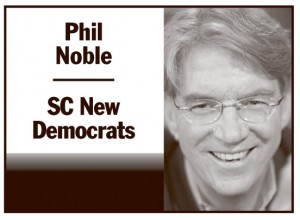‘Etc’ for South Carolina — It’s not what you think
Etc are three little letters we run across most every day — we hardly notice them. But when it comes to South Carolina and our future, ‘etc’ can be a real disaster or it can be our great hope.
Confused? Let me explain.
 Etc (usually written with a period at the end as etc.) is short for et cetera, a Latin phrase that the Cambridge Dictionary defines as … and other similar things. Another way of thinking about etc is “more of the same.”
Etc (usually written with a period at the end as etc.) is short for et cetera, a Latin phrase that the Cambridge Dictionary defines as … and other similar things. Another way of thinking about etc is “more of the same.”
This “more of the same” idea as it applies to South Carolina is a very big problem for our state and our future.
While we are talking about words and the future, let me suggest that for South Carolina perhaps the eight worst words in the English language are “that’s the way we have always done it.” If you take this phrase and add etc at the end, well you’ve pretty much described the old ways of thinking that has held our state back for the last couple of hundred years.
Unfortunately, there are some folks in our state who still live by this idea of the past — and you can find a pretty good collection of them hanging around the Statehouse in Columbia when the Legislature is in session.
But, let me offer another more hopeful definition of etc — think education, technology and creativity. While the former etc leads to a rather bleak and empty future for our state, this second etc is the pathway to a more bright and hopeful future.
Let’s start with “e” for education. My second favorite governor of all time (after Gov. Richard Riley) was Bill Winter in Mississippi. For more than 30 years, Winter repeated the same phrase in almost every speech he made: “For us as individuals and as a state, the road to a better future runs past the school house door.”
And indeed it does. Both Winter and Riley were champions of the most far reaching education reforms that their state had seen in 100 years — but unfortunately their successors pretty much reverted to the old etc — more of the same.
Next is “t” for technology. Unless you have been living in a cave for the last generation, you understand that digital technology has, in the words of Bill Gates, “begun to transform our world on the same dimension as the invention of printing and the coming of the industrial age.”
The invention of printing and the coming of the industrial age? Yeah, he’s right: it’s that big.
We in South Carolina (or any other place in the world) that fully and radically embraces digital technology throughout society and especially in education — have the power to transform their world.
Whoa, you say … what does “fully and radically embrace digital technology” mean?
The answer to this brings us to the “c” in etc. C stands for creativity, i.e. Steve Job’s Think Different admonition and Apple’s advertising campaign. This creativity is the diametrical opposite of the old thinking of etc … more of the same.
Let me give you two similar examples of creativity in this new Digital Age, one from South Carolina and one global.
In the late 1990s, a group of far sighted educators and business folks came together and raised more than $1 million and put 350 educational laptops in some of South Carolina’s lowest performing schools. It was a pilot project of the One Laptop Per Child (OLPC) program developed at the MIT Media Labs. (Full disclosure: I worked with this group.) The results were astoundingly good. An independent evaluation by then Superintendent of Education Jim Rex found that providing these computers was “dollar for dollar the single best thing we can do to improve education in our state.”
Despite this evaluation, some leaders in the Legislature reneged on their promise and did not fund an expansion of the program. (See the first definition of etc above.)
Now, the global example of “fully and radically embracing digital technology.” This week the British Broadcasting Company (BBC) launched Micro:bit. It’s a “pocket-sized computer with motion detection, a built in compass and Bluetooth technology, which is to be given free to every child in the 7th grade across the UK. The project was a collaboration between 29 partners with the ambition to inspire digital creativity and develop a new generation of tech pioneers.” (Full disclosure: BBC was a client of my company and Tony Hall, the head of BBC who launched the Micro:bit, was once on our board.)
The BBC is initially distributing more than 1 million Micro:bits with plans to expand to other grades once the project is evaluated. Most of the cost is being covered by the project’s business partners. (Sound familiar — see SC OLPC project above.)
No one knows for sure what will be the eventual impact of the BBC’s Micro:bit distribution. But this we do know for 100% sure: The etc of traditional South Carolina thinking is going to ensue 20th Century (or 19th Century) progress for our state and the BBC and OLPC version of etc is all about 21st Century progress.
Etc … three little letters … two different futures.
The choice is ours.
Phil Noble is a businessman in Charleston and president of the S.C. New Democrats, an independent reform group started by former Gov. Richard Riley to bring change and reform. He can be reached at phil@philnoble.com.



























